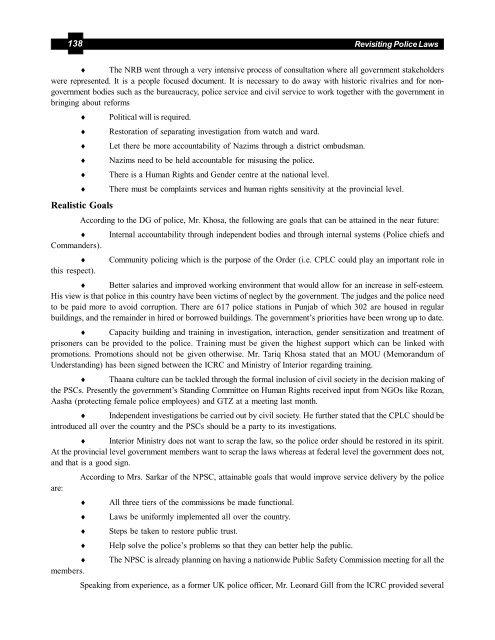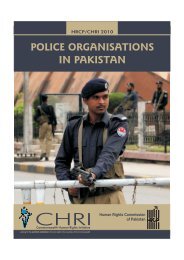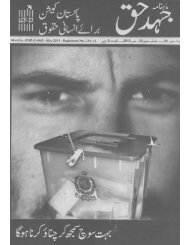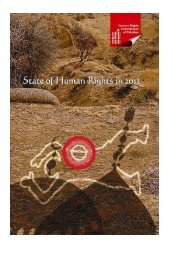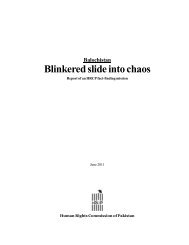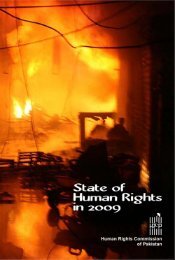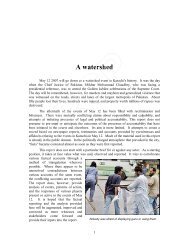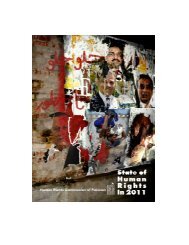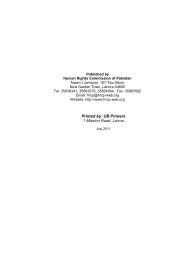Download PDF file - Human Rights Commission of Pakistan
Download PDF file - Human Rights Commission of Pakistan
Download PDF file - Human Rights Commission of Pakistan
- No tags were found...
Create successful ePaper yourself
Turn your PDF publications into a flip-book with our unique Google optimized e-Paper software.
138Revisiting Police Laws The NRB went through a very intensive process <strong>of</strong> consultation where all government stakeholderswere represented. It is a people focused document. It is necessary to do away with historic rivalries and for nongovernmentbodies such as the bureaucracy, police service and civil service to work together with the government inbringing about reformsRealistic GoalsCommanders).this respect).Political will is required.Restoration <strong>of</strong> separating investigation from watch and ward.Let there be more accountability <strong>of</strong> Nazims through a district ombudsman.Nazims need to be held accountable for misusing the police.There is a <strong>Human</strong> <strong>Rights</strong> and Gender centre at the national level.There must be complaints services and human rights sensitivity at the provincial level.According to the DG <strong>of</strong> police, Mr. Khosa, the following are goals that can be attained in the near future:Internal accountability through independent bodies and through internal systems (Police chiefs andCommunity policing which is the purpose <strong>of</strong> the Order (i.e. CPLC could play an important role in Better salaries and improved working environment that would allow for an increase in self-esteem.His view is that police in this country have been victims <strong>of</strong> neglect by the government. The judges and the police needto be paid more to avoid corruption. There are 617 police stations in Punjab <strong>of</strong> which 302 are housed in regularbuildings, and the remainder in hired or borrowed buildings. The government’s priorities have been wrong up to date. Capacity building and training in investigation, interaction, gender sensitization and treatment <strong>of</strong>prisoners can be provided to the police. Training must be given the highest support which can be linked withpromotions. Promotions should not be given otherwise. Mr. Tariq Khosa stated that an MOU (Memorandum <strong>of</strong>Understanding) has been signed between the ICRC and Ministry <strong>of</strong> Interior regarding training. Thaana culture can be tackled through the formal inclusion <strong>of</strong> civil society in the decision making <strong>of</strong>the PSCs. Presently the government’s Standing Committee on <strong>Human</strong> <strong>Rights</strong> received input from NGOs like Rozan,Aasha (protecting female police employees) and GTZ at a meeting last month. Independent investigations be carried out by civil society. He further stated that the CPLC should beintroduced all over the country and the PSCs should be a party to its investigations. Interior Ministry does not want to scrap the law, so the police order should be restored in its spirit.At the provincial level government members want to scrap the laws whereas at federal level the government does not,and that is a good sign.are:According to Mrs. Sarkar <strong>of</strong> the NPSC, attainable goals that would improve service delivery by the policemembers.All three tiers <strong>of</strong> the commissions be made functional.Laws be uniformly implemented all over the country.Steps be taken to restore public trust.Help solve the police’s problems so that they can better help the public.The NPSC is already planning on having a nationwide Public Safety <strong>Commission</strong> meeting for all theSpeaking from experience, as a former UK police <strong>of</strong>ficer, Mr. Leonard Gill from the ICRC provided several


